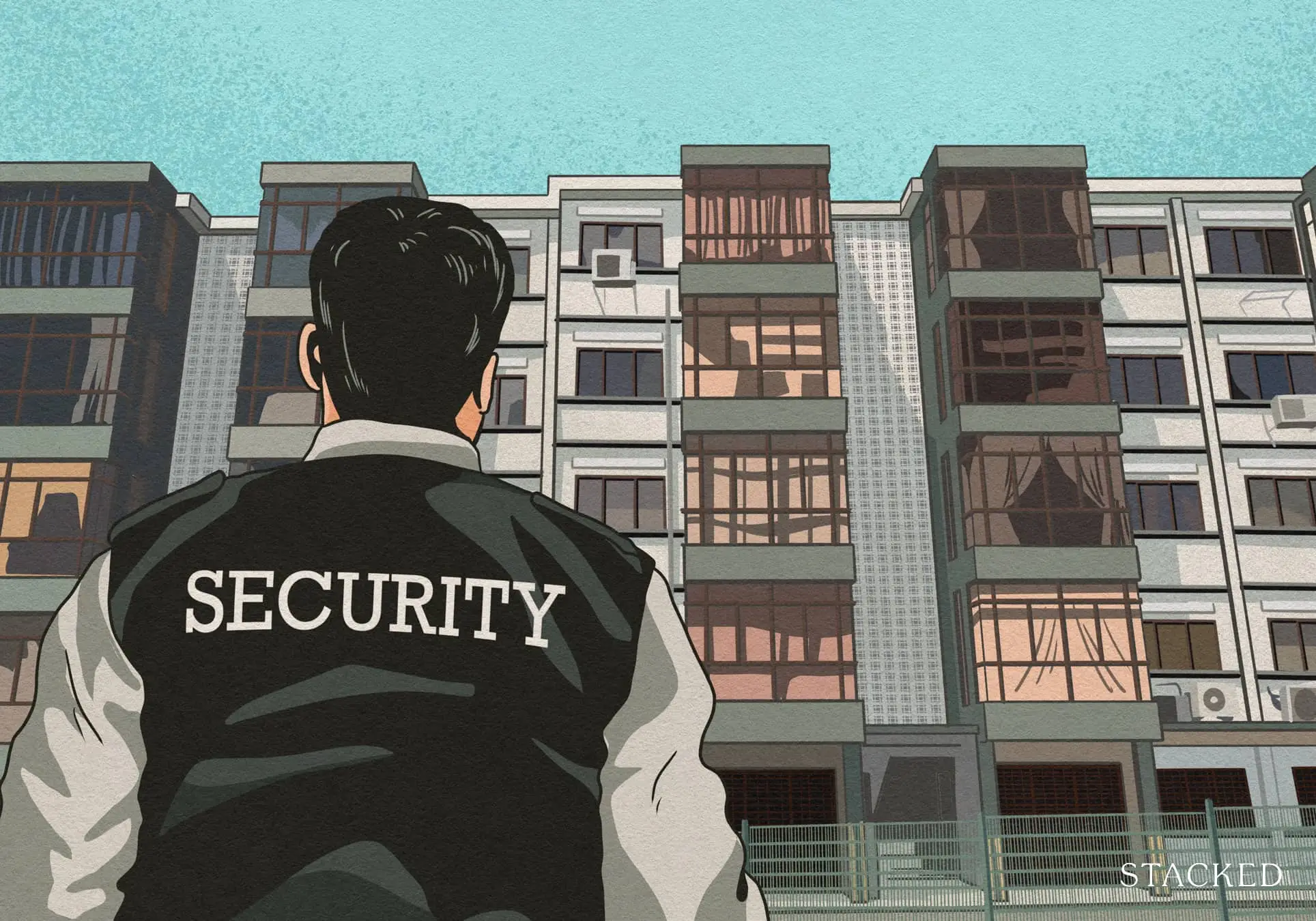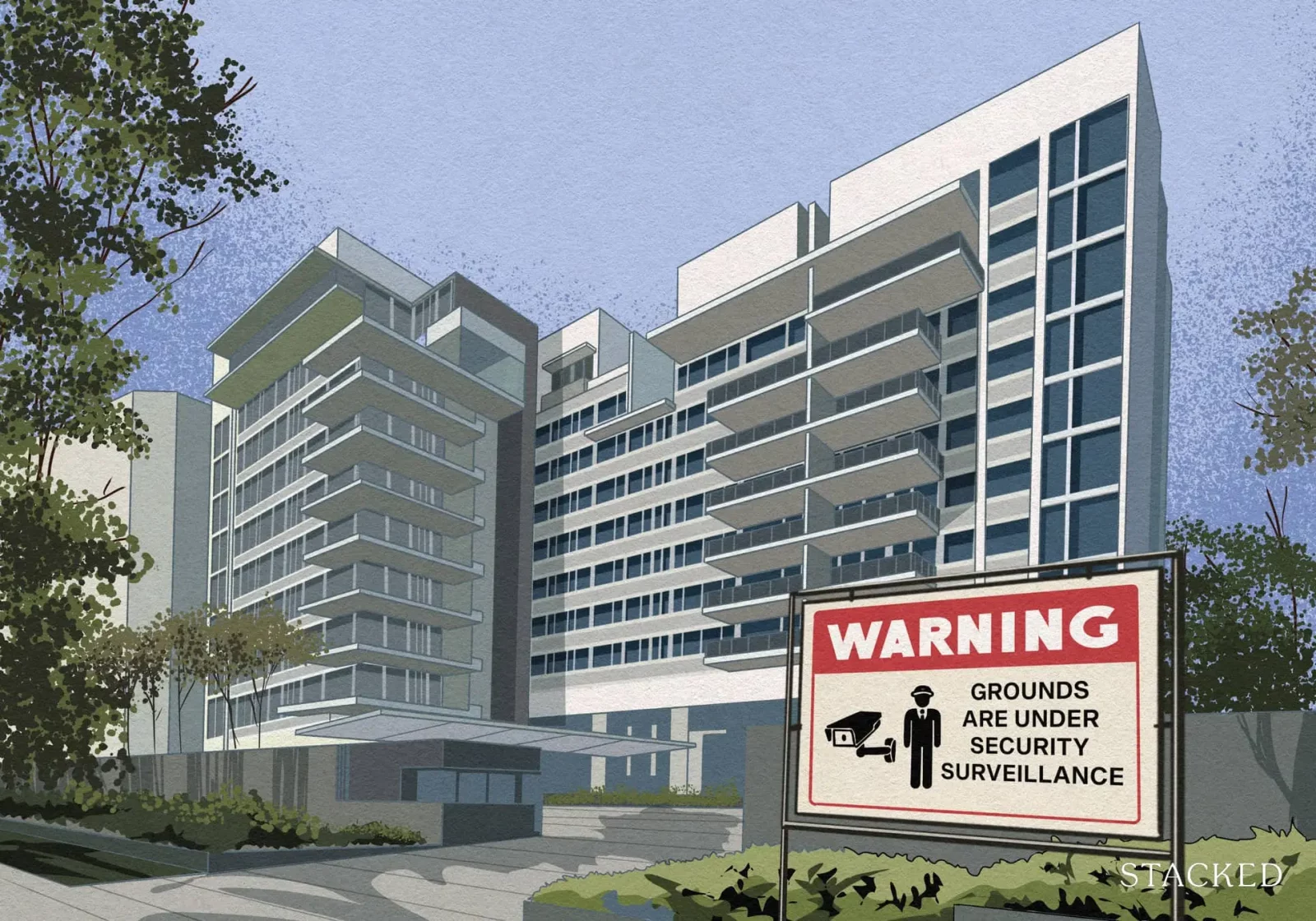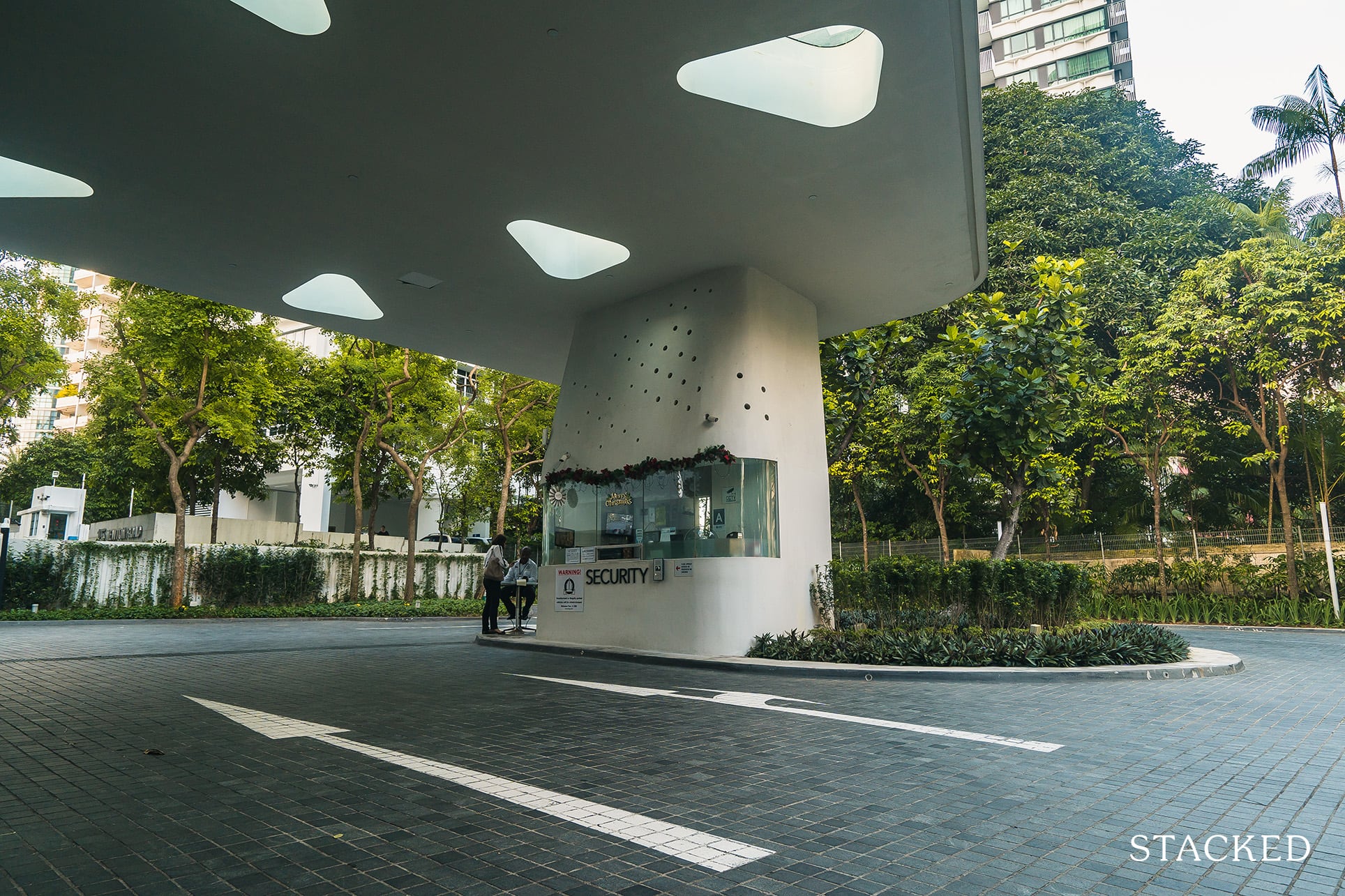The Difficult Relationship We Have With Condo Security Guards In Singapore
September 7, 2023

Over the past week, we were looking for condos that had negative reviews, and the possible reasons. It occurs to me upon reading the comments, that a lot of this revolves around “rude security guards”, or “rude management” (and for the most part, when people say rude management, they often mean it was a guard who was rude to them).
Sometimes these incidents go public in a big way, as was the case of this resident shouting at condo security in 2019. For every such incident, many more go unreported. Just last week, for instance, a reader got into a shouting match with a security guard, who stopped an ambulance for more than 12 minutes (her father was having a stroke at the time, and the guard was busy asking the ambulance drivers a whole bunch of details they could have checked later).
Another recent case involved a security guard getting punched and even had a chair thrown at him. It seems though, that it wasn’t an unprovoked attack, as the same security guard is also under investigation for hurting an 11-year-old child.
I’ve also had personal involvement with this. One of my tenants, who says she was subject to racial slurs by the condo guard, got into a physical altercation with him. This resulted in the guard threatening to sue her, and her possible expulsion from school. As the landlord, I was inevitably embroiled in it too (so much for “shake leg and collect rent.”)
At least three home buyers I’ve spoken to, over the past year, have said they prefer an apartment or walk-up with no security guards. This is because (1) crime rates are so low it’s an unnecessary expense, and (2) security guards are a hassle, making their visitors register, sign logbooks, etc.
I feel this difficult relationship with condo guards boils down to three main problems:
- It’s counterintuitive to pay someone to have authority over you
- Condo management and condo security often have an adversarial relationship
- Security companies seem to neglect communication skills
So many readers write in because they're unsure what to do next, and don't know who to trust.
If this sounds familiar, we offer structured 1-to-1 consultations where we walk through your finances, goals, and market options objectively.
No obligation. Just clarity.
Learn more here.
1. It’s counterintuitive to pay someone to have authority over you
I’m sure everyone understands that condo security exists to protect the collective owners, there’s a mutual agreement that the guards of limited authority, etc. But what we understand on a mental level often conflicts with gut instinct.
There is, at heart, a counterintuitive element to paying someone to enforce laws on you. To use an analogy, very few drivers with fines would call themselves happy customers of the traffic police.
Condo owners pay for security via their monthly maintenance fees; and they pay quite a bit for security, if you compare that expense to HDB conservancy fees. It can be hard to accept being fined, scolded, or ordered around by someone, when you’re forking out $400+ a month that also goes toward paying them. And this also goes the other way: Condo security guards have a tough time enforcing the rules when, on an indirect level, they’re aware the residents are their boss’ boss.
This can lead to residents becoming quite indignant, when a condo guard tells their visitors to move their car or tells them to get off the tennis court because their booking didn’t go through.
There are, also, residents who think of security guards as if they’re some kind of private mercenary company. To them, the condo guards are meant to help them against others (e.g., loan sharks, burglars, maybe other people’s pets and children), not to be the ones who are working “against” them.
2. Condo management and condo security often have an adversarial relationship

Why are condo security guards so “ngeow” or “on the ball”? The answer may be your own condo management.
More from Stacked
We Are In Our 60s And Own An HDB In Ang Mo Kio: Should We Downgrade To A 3-Room, Apply For A BTO, Or Buy An EC?
Hi Stacked Homes,
Some security companies may have to pay liquidated damages, if they don’t do their job right.
If the security team allows visitors to park in the wrong lots, and don’t wheel clamp them, then the security company pays fines.
If the security guard doesn’t block off one of the lifts for renovators, thus annoying half the residents in a two-lift block, they pay fines.
If condo security doesn’t drive domestic helpers out of gyms and pools (because that’s what the management agreed on), they can end up paying a fine.
This has resulted in a bizarre police-and-thief scenario, where condo management is constantly trying to “catch” security doing the wrong thing. The problem is, that this reduces the flexibility given to security guards, which may be needed in dealing with residents.

For example: say your visiting friend has parked in the wrong spot. It’s only for 20 minutes to drop something off. The security guard, if it were up to him, would probably just let it slide. But they can’t do that if condo management is lurking in the background, ready to impose fines if he doesn’t wheel clamp your friend’s car.
Imagine a work environment where your manager literally fines you for every mistake they can catch. Maybe it’s great for lowering payroll costs, but it’s bound to make you cranky and rigid.
3. Security companies seem to neglect communication skills
As the old adage goes, it’s not what you say but how you say it. A common complaint among condo residents is that the guard “could have said it nicely.” Sometimes residents don’t object to the guards enforcing the rules, just the hectoring or abrasive tone that’s involved.
This has been reflected to security companies quite often, and some have taken action. But to be frank, there’s been little improvement over the past decade. Most security firms focus their training on other elements, such as how to intruders, organise patrols, etc. I don’t doubt the importance of that, but angry run-ins with residents make those other tasks harder too.
It may be time for a tweak in the security guard’s role
Perhaps instead of positioning them as enforcement, security guards can instead be hired as facilitators, or a concierge service. This has less aggressive connotations, and can feel like less of an imposition on residents.
This also allows for an expanded role and further training, which could justify higher pay (although that also depends on the willingness of condo management, and whether they’d appreciate a more versatile and approachable team).
I’d argue it’s more practical to have a concierge trained to help mobility-challenged passengers get in and out of cars, than it is to have someone whose sole job is to raise and lower the gantry pole. The same service can still inform people to not play ball games in certain areas, or record the names of people coming in.
How is your relationship with your condo’s security guards? What would you change if you could? Comment and let us know. You can also follow us on Stacked, for news and reviews of various condo projects in Singapore.
At Stacked, we like to look beyond the headlines and surface-level numbers, and focus on how things play out in the real world.
If you’d like to discuss how this applies to your own circumstances, you can reach out for a one-to-one consultation here.
And if you simply have a question or want to share a thought, feel free to write to us at stories@stackedhomes.com — we read every message.
Frequently asked questions
Why do residents often have a difficult relationship with condo security guards in Singapore?
What are some common complaints residents have about security guards in Singapore condos?
Why do condo owners feel uncomfortable paying for security guards?
How does condo management influence the relationship with security guards?
What role could security guards play to improve their relationship with residents?
Ryan J. Ong
A seasoned content strategist with over 17 years in the real estate and financial journalism sectors, Ryan has built a reputation for transforming complex industry jargon into accessible knowledge. With a track record of writing and editing for leading financial platforms and publications, Ryan's expertise has been recognised across various media outlets. His role as a former content editor for 99.co and a co-host for CNA 938's Open House programme underscores his commitment to providing valuable insights into the property market.Need help with a property decision?
Speak to our team →Read next from Property Market Commentary

Property Market Commentary How I’d Invest $12 Million On Property If I Won The 2026 Toto Hongbao Draw

Property Market Commentary We Review 7 Of The June 2026 BTO Launch Sites – Which Is The Best Option For You?

Property Market Commentary Why Some Old HDB Flats Hold Value Longer Than Others

Property Market Commentary We Analysed HDB Price Growth — Here’s When Lease Decay Actually Hits (By Estate)
Latest Posts

Singapore Property News I’m Retired And Own A Freehold Condo — Should I Downgrade To An HDB Flat?

New Launch Condo Reviews What $1.8M Buys You In Phuket Today — Inside A New Beachfront Development

Overseas Property Investing This Singaporean Has Been Building Property In Japan Since 2015 — Here’s What He Says Investors Should Know





































0 Comments